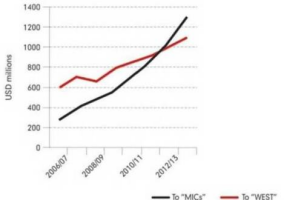The heads of United Nations Economic Commission for Africa (UNECA) and European Union (EU) agree to work towards benefits of the Economic Commission for Africa (EPAs) for Africa’s economies.
The Executive Secretary of ECA), Ms. Vera Songwe this week discussed EPAs with the European Union Ambassador, Mr. Ranieri Sabatucci, and the EU’s Head of Cooperation, Mr. Francisco Carreras Sequeros.
The two organizations noted that Africa had advanced substantially on the CFTA and discussed the alignment of EPAs and the CFTA in support of the regional integration agenda.
A driver of expected benefits from the CFTA is the more diversified nature of intra-African trade, which is expected to contribute to the industrialization efforts of African countries.
The head of the EU Commission noted that the EPAs had been designed as regional integration-oriented instruments and hold regional integration as an objective, similar to the CFTA.
Ms. Songwe noted that Africa would derive trade policy coherence by having a robust CFTA guiding other trade agreements, to include the EPAs and the African Growth and Opportunity Act (AGOA).
In assessing the contributions of EPAs to trade gains for African countries, the two heads agreed that the EU and the ECA would need to jointly assess the impact of the EPAs on intra-African trade based on robust evidence in the context of the ongoing Continental Frees Trade Area negotiations.
Expressing optimism, Mr. Sabatucci said; “We are in the relationship because of our interest in a stronger African Union and we are very keen to continue working with you. We want to see ECA do well for Africa.”
The meeting touched on areas of collaboration including the Continental Free Trade Area (CFTA), the Climate Change agenda and the Africa Land Policy Initiative; as well as the need for further partnership and collaboration between the EU and the ECA in supporting the African Union Commission (AUC) and Agenda 2063.
On the Land Policy Initiative, Ms. Songwe underscored the urgency of enacting land policies to enhance productive land use on the continent and called for sustained support to a successor phase of the initiative as a strong deterrent for migration.
In noting the complexities of enacting land policies, which could take more time to implement than envisaged, Ms. Songwe said: “Effective land policy is particularly relevant for women and youth working in the agricultural sector and underpins Africa’s agro-processing industrialization phase.”
In acknowledging the importance of ClimDev and the Land Policy Initiative in support of the continental development agenda, the two institutions committed to further exchange notes in support of successor phases of the two programmes of cooperation.

